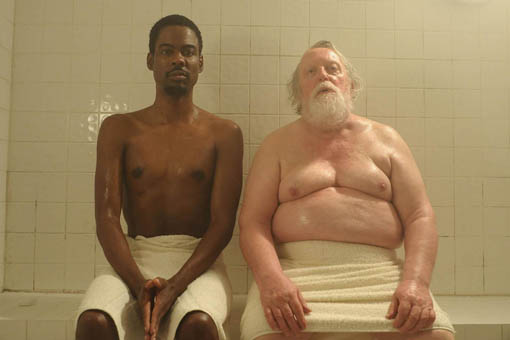Sign up for the
TSL Newsletter
and get $50 off Final Draft 12
By Matt Meier · August 12, 2012

The comedy of manners is a genre typically defined by its satirical depiction of the behaviors and interactions of one or multiple social classes. I would be more inclined to define Julie Delpy’s new comedy of manners, 2 Days in New York, as a highbrow farce of tactless relatives exchanging witty banter amidst a plethora of misguided though relatively inconsequential decisions. To each his own, I guess.
Loosely related to her previous film 2 Days in Paris, writer/director Julie Delpy stars in 2 Days in New York alongside Chris Rock as Marion and Mingus, respectively. They live a rather cozy life with two children from previous marriages: Willow (Talen Riley), Mingus’ 9-year-old daughter; and Lulu (Owen Shipman), Marion’s 4-year-old son. Mingus is a writer and talk show DJ and Marion is—well, I don’t know what Marion does exactly. She’s an artist of sorts, though apparently a less than successful one despite her ostensible wealth, and her newest artistic venture includes “selling her soul,” which is exactly what it sounds like: auctioning off a piece of paper that gives the rights of her soul to the highest bidder.
Their professions only provide fleeting relevance within the plotline, which centers on the unceremonious two-day visit of Marion’s relatives. To describe the relatives as “caricatures” would be a generous understatement, though that is a common element of most comedies of manners. Marion’s father, Jeannot (Albert Delpy, Ms. Delpy’s real-life father), is the impish and hypersexual old Frenchman who doesn’t speak a lick of English beyond the occasional fragmented reference to fornication. Rose (Alexia Landeau), Marion’s temptress sister, carries herself with an air of vanity that allows her to be both condescending and frivolous at once as she unceasingly (and often intentionally) works her way under Marion’s skin.
Rose’s most insensitive act of abrasion comes in the form of the boyfriend she brings with her, Manu (Alex Nahon), who is also Marion’s ex. The punch-line caricature of the film, Manu offers little more to the story beyond his superlative ignorance. He refers to Mingus’ sister, Elizabeth, as a hotter version of Beyoncé, a visual correlation derivative of only their race, and unapologetically mistakes a Middle Eastern friend of Mingus as Kal Penn (i.e. “Kumar,” since Manu clearly lacks the knowledge to know the titular White Castle co-star by his actual name). A drug bust mercifully (and conveniently) sends Manu back to France roughly halfway through the film, but his racist shtick runs stale long before that.
As one would expect, Marion and Mingus provide the most complete characters of the film, “complete” being a relative term in this case. The strains of their relationship are presumably sympathetic enough—being neither in my forties nor married nor previously divorced nor with child, I concede I lack the personal foundation to wholly empathize. Independently of each other, however, Marion and Mingus lack the complexity to evoke more than a mild investment in the fruition of their happiness. Marion’s neurosis, a quality often forgivingly associated with most artistic types, borders on self-absorption to the point of calling into question her driving motivations and desires; that the culmination of her success in the film derives from a well-planted earlier lie certainly does little to quell any doubts surrounding her character’s arc (or lack thereof).
Her behavior certainly motivates Mingus’ evolution from placid to “pissed off.” Mingus often responds to the circumstantial absurdity forced upon him with frustrating complacency and understanding. He is as loving and supportive a boyfriend as one could ask for, but his patience (or passiveness) is the Achilles heal of his character. He vents his problems to a cardboard Barack Obama cutout while restricting most confrontations with Marion to little more than understated disapproval. Mingus is not singularly wimpy or spineless. More accurately, his relationship with Marion defines his character so wholly that his sense of independent identity rarely shines through. The question that drives him (and that drives the film itself) is whether or not their relationship will survive the weekend with the relatives—a practical and relatable premise, for sure, but one that hardly borders on profound.
Admittedly, I likely fall outside the target audience Delpy had in mind when making this film, and I grant 2 Days in New York the benefit of the doubt as being a film that could conceivably appeal to the preoccupations of others far more than my own. That being said, even my most objective critical self cannot praise 2 Days in New York as anything more than a simple comedy of manners, one that panders to the comedic gratification of familial dysfunction while refusing to dig for the deeper meaning behind such relatable themes. The acclaimed writer/director has certainly done enough to please her existing fans and perhaps even win over some new ones. 2 Days in New York may have done enough to warrant the trip to the theater, but it does little else to warrant being remembered once you’ve left it.